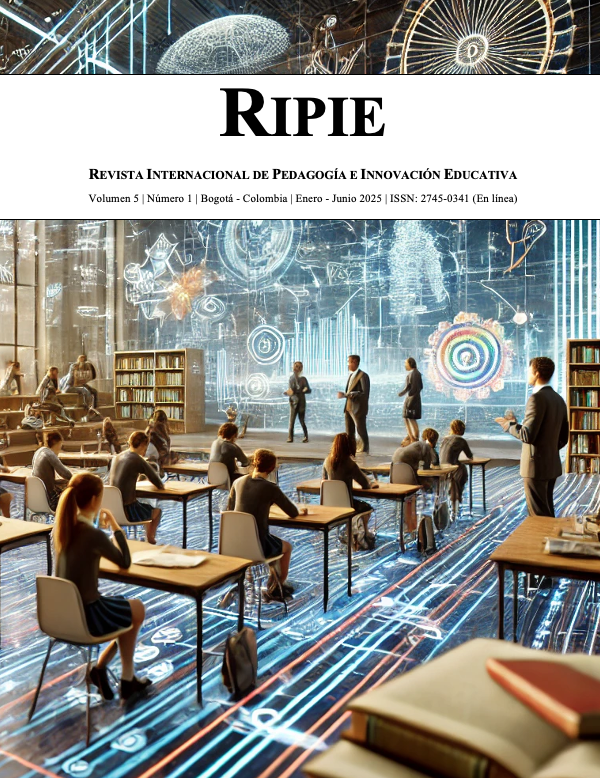Factors influencing the development of digital competences in the Piła region
DOI:
https://doi.org/10.51660/ripie51273Keywords:
digital education, digitalization, statistical correlations, digital competencies, advanced technologies, development factors, educational recommendationsAbstract
This article examines the factors influencing the development of digital competencies in the Piła region. Key elements influencing these competencies, including employee education and technological innovations, were identified in confrontation with demographic factors. The research was conducted using the diagnostic survey methodology, covering 53 companies and 1,312 employees. Correlations between variables were analyzed using statistical tests, including the chi-square and Student's t-test. The data obtained showed strong correlations between expenditure on education and the level of digital competencies, as well as between investments in modern technologies and employees' digital skills. In addition, a significant impact of demographic factors such as education, gender and age on the development of digital competencies was noted. The results emphasize the need to intensify educational activities aimed at employees from demographic groups in more difficult situations, indicating the important role of local authorities in supporting these trends. Recommendations indicate the need for further analysis of the factors shaping digital competencies and activities promoting education in this area.
Downloads
References
Batorski, D., & Płoszaj, A. (2012). Diagnosis and recommendations in the area of digital competencies. UW.
Bugowski, Ł. K., & Trzaska, K. (2024). The role of digital competencies in sustainable development. (pp. 161-176). UB.
Chądrzyński, M., Gruziel, K., Kacperska, E., Klusek, T., & Utzig, M. (2021). Poland in the era of digitalization. SGGW.
Chojnacka, O., Domańska, E., Jankiewicz, A., Kwaśnik, A., Lange, R., Pudłowska, A., Rylski, A., Rywczyńska, A., & Wrońska, A. (Eds.). (2022). The pandemic and changes in everyday use of the Internet. NASK National Research Institute.
Fiebich, Ł. (2018). Digital competencies – stationary training program. WSZiA.
Filipowicz, G. (2004). Management of professional competences. PWE.
Głomb, K. (2020). Digital transformation of the labour market and industry in the perspective of 2030. Stowarzyszenie Miasta w Internecie.
Jabłoński, M. (2016). The essence, references and attributes of employee competences in working with information. UE.
Jurek, Ł. (2023). The prospects of economic growth in the era of population ageing. In W. Koczur (Ed.), Economic consequences of demographic changes (pp. 65-77). Materials from the 3rd Demographic Congress.
Kucinski, K. (2010). Methodology of economic sciences. Difin.
Kupczyk, T., & Stor, M. (2017). Competence management: Theory, research and practice. WSH.
Maszke, A. W. (2004). Methodological foundations of research. URz.
Pilch, T., & Bauman, T. (2001). Principles of pedagogical research. Żak.
Walkowiak, R. (2024). Model of competencies of managers of local government organizations (p. 58). UW-M.
Górska-Rożej, K. (2014). Identification of competency components in the context of effective competency management. Obronność, 2(10), 12-31.
Kowalska, K. (2016). Deviant behaviour of minors. PTK, 23, 7-28.
Rogacka, M. (2022). Digital competencies in the workplace. E-mentor, 5(97), 53-64.
Helsper, E. (2014, March 25). Harnessing ICT for social action, a digital volunteering program. Paper presented at Digital Inclusion in Europe: Evaluating Policy and Practice, Spain.
Simon, F., & Yasmeen, M. (2018). Building tomorrow's digital skills: What conclusions can we draw from international comparative indicators? Report. Paris.
Skorupska, J. (2018). Artificial Intelligence and digital competencies of future employees. Council for Digitization.
Tarkowski, A., Majdecka, E., Penza-Gabler, Z., Sienkiewicz, M., & Stunża, G. D. (2018). Analysis of strategies and actions aimed at developing digital competencies in the European Union countries. Centrum Cyfrowe.
Vuorikari, R., Kluzer, S., & Punie, Y. (2022). Digital Competence Framework for Citizens. ECCC Foundation.
European Commission/EACEA/Eurydice. (2023). Digital Education at School in Europe. Eurydice Report. Publications Office of the European Union.
McKinsey & Company. (2016). A chance to jump into the global economic first league (pp. 25-29). Warsaw.
UNESCO. (2018). Managing tomorrow's digital skills - What conclusions we can draw from international comparative indicators.
Council of Ministers. (2023). Resolution No. 24 of 21 February 2023 on the establishment of a government program called the "Digital Competence Development Program". Journal of Laws, item 318.
European Parliament and Council. (2006). Recommendation of 18 December 2006 on key competencies for lifelong learning. Official Journal of the European Union, L 394/10.
Council of the European Union. (2018). Recommendation on Key Competencies for Lifelong Learning of 22 May 2018. ST 9009.
Drabik, L., Kubiak-Sokół, A., & Sobol, E. (2023). Dictionary of the Polish language. PWN.
GUS. (2019). Registered unemployed and unemployment rate in Piła County. As of the end of September 2019.
Downloads
Published
Issue
Section
License
Copyright (c) 2025 International Journal of Pedagogy and Educational Innovation

This work is licensed under a Creative Commons Attribution-NonCommercial-ShareAlike 4.0 International License.
Articles are published under the terms of a licence that permits use, distribution and reproduction in any medium, provided that the original work is properly cited. Ed&TIC retains the proprietary rights to the published works and actively promotes the reuse of these works under the terms of the aforementioned licence, which encourages the dissemination of knowledge and collaboration in the academic community.


